UPDATE: As pointed out by @rmaddy, there was a misunderstanding about what visit.olcreatedat was.
This first answer is based on the assumption that visit.olcreatedat is an
NSDate. For an answer that assumes that visit.olcreatedat is an NSString containing a formatted date, read the second part of this answer.
visit.olcreatedat is an NSDate
- (void)viewDidLoad {
[super viewDidLoad];
// Alloc the date formatter in a method that gets run only when the controller appears, and not during scroll operations or UI updates.
self.outputDateFormatter = [[NSDateFormatter alloc] init];
[self.outputDateFormatter setDateFormat:@"EEEE, dd MMM yyyy HH:mm:ss z"];
}
- (UITableViewCell*)tableView:(UITableView*)tableView cellForRowAtIndexPath:(NSIndexPath*)indexPath: {
// dequeue or create the cell...
// ...
// ...
OLVisit *visit = [self.visits objectAtIndex:indexPath.row];
NSString * strVisitDate = [self.outputDateFormatter stringFromDate:visit.olcreatedat];
// Here you can assign the string to the right UILabel
cell.textLabel.text = strVisitDate;
return cell;
}
visit.olcreatedat is an NSString
Do you want to convert the visit.olcreatedat to the format EEEE, dd MMM yyyy HH:mm:ss z? If so, let's go through each step.
First, you need to convert the visit.olcreatedat string (stored in strVisitDate) to an actual NSDate object, visitDate. So to make this step work, you need an NSDateFormatter that accepts the visit.olcreatedat format: yyyy-MM-dd HH:mm:ss z.
Then, you want to convert the obtained visitDate NSDate to the format you like, so you need another NSDateFormatter, with the format EEEE, dd MMM yyyy HH:mm:ss z.
- (void)viewDidLoad {
[super viewDidLoad];
// Alloc the date formatter in a method that gets run only when the controller appears, and not during scroll operations or UI updates.
self.inputDateFormatter = [[NSDateFormatter alloc] init];
[self.inputDateFormatter setDateFormat:@"yyyy-MM-dd HH:mm:ss z"];
self.outputDateFormatter = [[NSDateFormatter alloc] init];
[self.outputDateFormatter setDateFormat:@"EEEE, dd MMM yyyy HH:mm:ss z"];
}
- (UITableViewCell*)tableView:(UITableView*)tableView cellForRowAtIndexPath:(NSIndexPath*)indexPath: {
// dequeue or create the cell...
// ...
// ...
OLVisit *visit = [self.visits objectAtIndex:indexPath.row];
NSString *strVisitDate = visit.olcreatedat;
NSDate *visitDate = [self.inputDateFormatter dateFromString:strVisitDate];
strVisitDate = [self.outputDateFormatter stringFromDate:visitDate];
// Here you can assign the string to the right UILabel
cell.textLabel.text = strVisitDate;
return cell;
}
